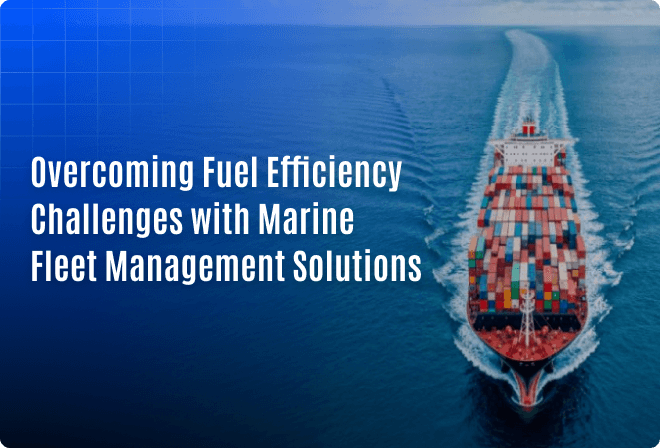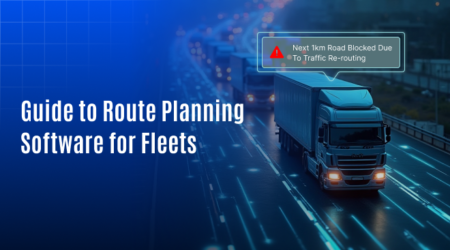Overcoming Fuel Usability Challenges with Marine Fleet Management Solutions

Fuel has always been one of the biggest line items in any marine fleet’s budget, often making up close to 50% of total operational costs. And with fuel prices climbing more than 20% in the last two years alone, the pressure on operators to manage consumption has never been greater.
But here’s the real issue: most fleets still don’t have complete visibility into how their fuel is actually being used. Between inaccurate logs, idle time at ports, and fuel theft incidents during bunkering or transit, valuable fuel and money is slipping through the cracks. Some industry reports suggest as much as 30% of fuel losses go completely unrecorded. That’s not just wasteful; it’s unsustainable.
Raising additional concerns for fleet operators, inefficient route planning and lack of real-time monitoring can lead to up to 15% more fuel being burned on every voyage. For a growing fleet, that adds up fast not just in rising costs but also in missed delivery windows, lower margins, and higher emissions.
The good news is, the tools to fix this already exist. Modern marine fleet management systems now offer real-time fuel tracking, smarter route planning, and instant alerts when things go off course. With the right technology in place, marine businesses can finally start making data-backed fuel decisions that protect their margins and scale their operations.
So, how do you go from reactive fuel logs to proactive fuel strategy? Let’s dive in.
What Is fuel usability in marine operations?
Fuel usability refers to how efficiently fuel is utilized by vessels during operations. It includes:
- Measuring accurate fuel consumption
- Monitoring fuel levels in real time
- Detecting fuel theft or leakage
- Optimizing routes for minimal fuel use
- Reducing idle time at sea and ports
Common fuel usability issues in maritime fleets
- Inaccurate consumption logs due to manual tracking
- Undetected fuel theft during bunkering or transit
- Idle engine hours increasing fuel waste
- Lack of data-driven decision-making in voyage planning
- No alerts or trends for unusual fuel behavior
The need for a marine fleet management solution
A marine fleet management system offers real-time visibility, smart alerts, and detailed analytics to help you regain control over fuel usage.
Why traditional methods fall short
- Paper logs can’t track real-time data
- Manual checks miss small leaks or theft
- Voyage planning often ignores real-time weather or sea data
- Human errors cause misreporting and delay in response
Key features that solve fuel usability problems
1. Real-time fuel monitoring
- Tracks fuel levels across multiple tanks
- Monitors consumption during sailing and idling
- Identifies sudden drops or inconsistencies in usage
2. Automated fuel reports
- Generates daily, weekly, and voyage-wise consumption reports
- Compares fuel efficiency across routes and vessel types
- Exports data for auditing and compliance
3. Fuel theft and leak alerts
- Sends instant alerts on abnormal consumption patterns
- Detects theft during bunkering or while docked
- Flags unauthorized fuel drainage
4. Route optimization based on fuel efficiency
- Plans routes based on sea conditions, engine performance, and fuel economy
- Avoids high-fuel-consuming routes
- Enhances ETA accuracy while minimizing fuel spend
5. Engine performance and idle monitoring
- Monitors RPM, engine load, and idle hours
- Flags over-revving or underperformance
- Helps with preventive maintenance planning
Business benefits of fuel optimization in marine fleets
Optimizing fuel usage doesn’t just save money it improves fleet efficiency, sustainability, and compliance.
Reduced operating costs
Track usage, identify wastage, and save up to 30% in fuel costs.
Better regulatory compliance
Ensure adherence to IMO regulations, MARPOL fuel rules, and port authority standards.
Lower emissions
Improve fuel-to-distance ratio and reduce CO2 footprint.
Enhanced vessel health
Better fuel tracking leads to smoother engine operations and fewer breakdowns.
Real-time decisions
Make smarter operational calls based on live data and alerts.
Industry use case: fuel optimization for offshore supply vessels
Challenge:
An offshore supply company in Southeast Asia faced high fuel loss and poor reporting across its 10-vessel fleet.
Solution:
A marine fleet management solution was deployed with fuel-level sensors and voyage analytics.
Results:
- 25% reduction in monthly fuel wastage
- Real-time bunkering supervision eliminated fuel pilferage
- Predictive maintenance schedules improved engine life by 15%
Choosing the right marine fleet management software
When selecting a solution, ensure it supports:
- Integration with fuel sensors and flow meters
- Multi-vessel tracking dashboard
- Weather and sea condition integration
- Regulatory and compliance reporting
- Mobile access and instant alerts
Summary: fuel control = fleet control
In today’s competitive marine industry, you can’t afford to lose control of your fuel usage. Investing in a marine fleet management solution gives you transparency, control, and efficiency.
You no longer have to guess where your fuel is going.
You’ll see it. Track it. Optimize it.



